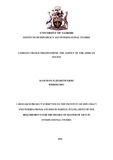| dc.description.abstract | This study investigates the impact of international negotiations on climate change with a focus on the role of Africa. Every year the UNFCCC convenes parties for international negotiations on climate change where agreements and decisions made inform international policy frameworks and strategies to deal with climate change. The stakes are high for Africa as it is among those continents worst affected by climate change. The study looks at the impact of climate change on development, human rights and security in Africa; evaluates international and regional institutional legal frameworks for climate change negotiation; and assesses the agency of African states in international negotiations on climate change. In the context of the present study, agency refers to the capacity of an actor to influence the outcome of global negotiations on climate change and strategies employed to achieve that objective. The current study is eclectic basing its analysis on the liberalism and realism theories. Neo-liberal institutionalism provides a suitable platform for global actors to agree on norms, rules and decision-making procedures. Realists opine that states are not pre-disposed to negotiations and only do so when negotiations increase their relative power resources. This explains the contemporary North-South conflict in climate change negotiations. This study assumes that climate change greatly impacts on Africa‟s economic growth, security and human rights; effective international and regional institutional legal frameworks on climate change provide strong basis for negotiations; and that the African agency contends with acute challenges in their role and influence in international negotiations on climate change. The present study adopts the research design of a survey. 12 African negotiators responded to questionnaires and 5 participated in interviews. Further interviews were conducted with 3 negotiators from other negotiating groups and 1 observer. On a scale of 5.0 where 1.0 represented very weak and 5.0 represented excellent, the Africa agency scored 2.12. Study findings show that the Africa agency has opportunities to leverage it‟s potential to influence international negotiations on climate change but contends with acute challenges in its role, major being lack of a secretariat and high attrition of negotiators. The study recommends increased high-level commitment by African governments to the climate change negotiation process, more funding for African negotiators, formalization of the negotiation group; and robust strategies in preparation, during and after the annual negotiation meetings on climate change. | en_US |



